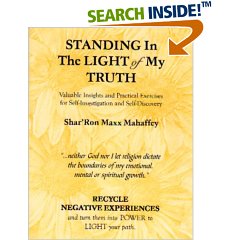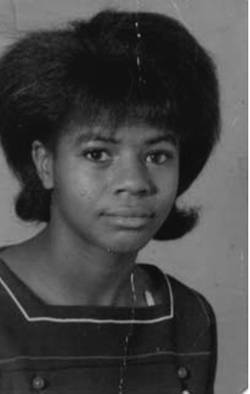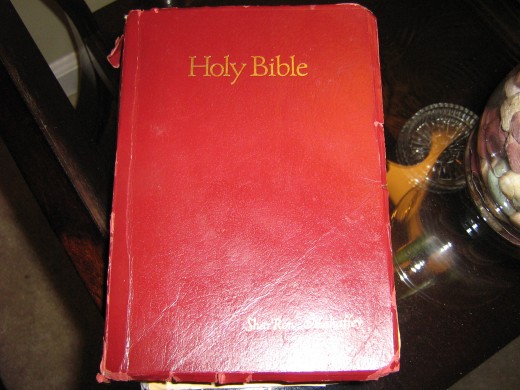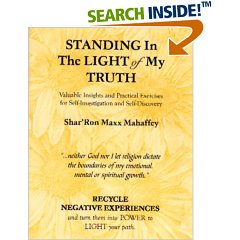God Is Not A Religion

Chapter 1: "Standing In The Light of My Truth"
“Blessed are those who are willing to ask the truth of God without fear, for only thus can you learn that His answer is the release from fear.” —A Course In Miracles, page 212, No. 7
I believe we are all spirits having a human experience. Our introduction to God, the Origin of all creation, may stem from religious ideology, but our continued connection to Him is not contingent upon religion or what sect you belong to.
Everything created on the earth, above and below it, was done so to serve God. He even created that which opposes Him. He has no special fondness for one person over another. He didn’t give one of us powers the other one does not have. We are all the same in His eyes. A priest or rabbi or preacher is no more special to God than a homeless drunk. The only difference God sees in them is that the priest or rabbi or preacher has accepted His Will to serve and exalt Him, and the drunk has chosen a different path. Even a person who acts immorally is not excluded from the Will of God but often times excluded from religious services. Morals can exist without religion, because it is our judgment of right and wrong that dictates good and ethical behavior, not ideology.
People who choose to worship God in a church or mosque, synagogue or temple have no more power than those of us who choose to worship Him in our homes with prayer and praise, and in our words and deeds. We all embody His powers of Hope, Faith, Love, and Trust. The greatest of these is Love. Those powers are irrespective of religious doctrines. You don’t have to be a Baptist or Methodist, Catholic or Protestant, Jew or Muslim to be privileged to the “fruits” of God’s Spirit.
Back in my youth, if you even mentioned God, the question that followed was “What church you go to?” If a girl talked about God, it frightened boys because they considered girls who went to church and prayed religious zealots. So I concealed my faith from most people because I didn’t want to be labeled religious. In my opinion, the connotation implied that I was judgmental, holier-than-thou, and hypocritical. That’s the way religious people were labeled back then. That perception is still around and it keeps many people from openly admitting they have a devoted relationship with God. It’s probably why believers like me who are non-church goers have latched on to the word spiritual to explain our beliefs.
Whenever I engage in a conversation about God with someone who doesn’t know my personal beliefs, I feel that I have to distinguish my beliefs from religion. “I’m not a religious person,” I say. “I’ve accepted Jesus, but I don’t participate in any religious expression of my faith anymore.” Then I go into my spiel that God is not a religion and is non-judgmental, and on and on. It appears that an easiness comes over the person after I make that declaration. I usually get a reply, such as, “I’m not religious either.” Hearing them say that makes me feel certain that my beliefs will not necessarily be accepted as their truth, but at least heard and respected.
While surfing the Internet during the writing of this piece, a pop-up advertisement appeared on my screen with an offer to cast a vote to this question: “Do you believe in God?” “Click Here to Vote,” it indicated. However, when I clicked on it to vote yes, that question was no longer there. The question became: “Are you religious?” Click yes or no. I clicked no, because I am not devoted to religious beliefs or observances. That’s what religious means. I am devoted to God Almighty. Period. Right there on my computer monitor was the misconception that religion created God.
"God is to us what we believe He is."
This is not an indictment of religion nor am I trying to downplay that religion has been universal at all stages of history and human geography. It is an important form of worship for millions of believers. Instead, I am passionately asserting that God is omnipresent. That is, He is present in all of us at the same time irrespective of beliefs or non-beliefs for that matter. My intention is to exalt God so that whatever valuable insight being offered for consideration can be heard without filtering it through the cynicism of religion.
God is to us what we believe He is. Some believers strongly accept as true that the only way to truly worship Him in spirit is in a church or mosque, synagogue or temple. They can’t seem to separate Him from the religious dogma. The simplest, most powerful, most humble, and most personal form of worship is prayer. It does not involve an intermediary, such as a minister, priest, or rabbi. It doesn’t require you to leave home because God dwells in our hearts and not in bricks, glass, stones, and wood. Therefore, we can worship Him anywhere.
God is not a religion but many of His more religious minded believers call us non-church goers liberal. They call us secular. They call us everything but God’s children. They use words intended to devalue our beliefs that one can worship God in deeds and prayer without intervention from religion. Faithfully serving God is just as much a way of life for many of us who don’t worship God in a church or mosque, synagogue or temple as it is for those who worship Him through their religion.
No litmus test of ideology is required when it comes to the Will of God. All that is necessary, first and foremost, is trust and humility—trust Him to know what’s best for you and the humility to let Him lead you to it. He is more interested in whether we can serve Him faithfully on a daily basis than whether a believer attends five o’clock Mass. He cares that we show our fellow human compassion, forgiveness, kindness, and love, regardless of ideology. He cares that we obey His Word and honor His Commandments. If religion can help believers worship Him in that way, more power to the believers. However, if believers can worship Him in spirit and fulfill His Will without ever walking through the door of a church or mosque, synagogue or temple, more power to the believers. God simply wants willing servants. He is not entangled in the religious power struggle.
I was 16 when I finally escaped my stepmother's abuse, and every churchgoer in town knew what was happening to my sister and me and did nothing to stop it.

Religion played an important role in my life in my youth [but it was when I also realized that God was not Baptist or Methodist or any other religion]. I have fond memories of going to church every Sunday. I liked our little quaint church. It was a refuge from my stepmother’s mental torture that I had to endure during the week. I was baptized in a muddy, country creek in Alabama at age twelve. When I was in the tenth grade, I taught Sunday school to adults. We studied the whole Bible, and not parts of it. The underlying message of every sermon was God is love, and He forgives all sins. We confessed our sins before one another, asked God to forgive us and help us to forgive ourselves. We lifted our voices and sang without a piano, an organ, a guitar, or drums. We had communion every Sunday, and we called each other brother or sister. We even put brother before our pastor’s last name, instead of reverend. It was a humbling experience, and I used to look forward to going to church hearing about how great God is. Still, I had many questions.
It had been instilled in me that you did not question God. My questions were not about Him but about religion. However, if you questioned your religious doctrine, you were questioning God. There was no distinction. Therefore, when I wanted to know why other churches practiced something so opposite of my church or why would God strike you dead for doing something wrong if He loved you or why do the innocent suffer and the guilty sometimes go free, the responses I got were either glossed over or half-heartedly explained. By the time I was out in the world as an adult, none of what I’d learned made sense anymore.
I did not live a so–called ‘holy life’, but God answered my prayers and blessed me just like He did those who called themselves a Christian and showed up for church on Sunday. I struggled with why did I need the church, when I could communicate with God without a preacher having to interpret the meaning of our conversations. I expected all good things from Him, all the while “sinning” based on religion’s interpretation of what constituted good or bad behavior.
Some believers spoke [speak] of God as if He sat [sits] on a throne handing down judgments for every little thing you did [do]wrong. How could that be?If He “knows my sitting down and my rising up; understand my thoughts afar off; comprehend my path and my lying down, and are acquainted with all my ways” (Psalm 139), then what is He judging me for? I thought it was mighty cruel of Him to know everything about me then use it against me. I would come to learn who was judging whom.
It was chilling to think of Him striking me dead for disobeying Him. Not the God that nursed my emotional wounds when I was a child, and delivered me from mental and physical abuse. There were so many contradictions. To say I was confused and disenchanted with religion is an understatement.
[I had learned at a very early age to rely on that small comforting voice inside me to endure the loss of both my parents by the time I was 11 and the physical and verbal abuse of my stepmother. I was brought up in the church (religion), but I was never taught to count on actual people being there for me. The zealots would preach that I could only count on God (Jesus). That would suggest to a young impressionable mind that any help that I needed would come falling from the sky or by some other mystical means that did not include humans. With that mindset, I should not have been surprised when no religious person stepped forward to stop my stepmother from beating my sister and I with boards and tree branches and putting a gun up to our heads for four dreadful years. I guess folks in town who saw God through the prism of their religion were, too, "waiting on God" to do something by some non-human mean. But it took three "humans" who had great passion for God but did not darken the door of a church to intervene and set us free from the savagery of my stepmother. This is a sampling of the distorted thinking that I got from my religious training as a young person.] But, I was not about to lose my connection to Him because I still believed, like I did at age ten, that He dwells in my heart. I had to keep searching.

"I stopped going to the many different churches and spent the better part of most Sundays studying the Bible like a textbook."
In 1983, after many years of carrying around perplexing beliefs about Him, I set out to relieve myself of all those questions. I first turned to religion for those answers because it had been ingrained in me that to get answers from God, you turn to the church. I had not yet been set free from that misconception.
I was already very familiar with traditional expressions of Christianity like Baptist and Methodist. To glean more insight about religion, I attended a non-traditional church that channeled spirits. That was a creepy experience, however, I believed then as I do now that our dead loved-ones are sometimes with us in their spirit form. I opened my mind to a church where a woman in a trance-like state feverishly uttered words in an unidentifiable language believers called tongues. I wanted to know what she said, but there was no one to interpret. I worshipped in a Jewish temple and a Catholic church. I read books on religion and its origin. By the time I was done crisscrossing religions, my head was spinning from all of the rituals. I was more confused than when I started out. I walked away from it feeling that one is never good enough in religion.
The one thing that I had not done was to trust my own interpretation of God’s Word and turn to the Bible to find the answers to my questions. I had a good mind, why couldn’t I read it for myself and trust my interpretation as I had trusted the religious leaders’ understanding of the Word. With the Bible in my hand and a strong desire to know the Truth, that same voice I trusted at ten-years-old guided me inside myself.
I stopped going to the many different churches and spent the better part of most Sundays studying the Bible like a textbook. During the week, I made time to study it at work during my lunch breaks and before I went to bed at night. Even today the plastic colored paper clips, folded pages, yellow and orange highlights and ink markings are still very evident. The pages are now yellowing and some of them are coming unglued, but there’s no way I would exchange it for a new one. The ocean of tears that I cried during my time of soul-discovery stain those pages.
"I never really experienced the education of God while involved with religion."
There were so many things that I interpreted differently during my Bible studies than what I’d learned even in my little country church. I remember during this time meeting an elderly woman who spoke proudly that she went to church every Sunday and sat in the same seat for fifty years. “Wow,” I exclaimed. However, I was really thinking that she should have had her own church by now. She went time and time again to hear the same thing over and over again.
Jesus spent most of His life teaching multitudes of people about God’s Love. He taught His Disciples the Word of God and sent them out into the world to share what they had learned from Him. He promoted each one of them to the level of teacher. But you never graduate from religion. That would mean leaving God for some believers because they see no distinction between their religion and the Deity. For them, it’s all one in the same.
I never really experienced the education of God while involved with religion. It was more about dire anecdotes and scriptures to convict believers for their sins and transgression than a “place of higher learning.” God loves a sinner just as much as the so-called righteous. I came across a scripture in Ephesians 7:20 that freed me from the guilt of my sins. It reads, “There is not a just man on earth who does good and does not sin.” It was one of the most liberating scriptures of my studies.
I witnessed a lot of judging during my religious experience. But I was made fully aware of the consequences of unfairly condemning and judging others in Matthew 7:1,6 “Judge not, that you be not judged. For with what judgment you judge, you will be judged…” and Luke 6:37: “Condemn not, and you shall not be condemned. Forgive and you shall be forgiven.” Later on in my studies, the Holy Spirit showed me the way to First John 1:8,10 which supported those scriptures: “If we say we have no sin, we deceive ourselves and the truth is not in us…If we say we have not sinned, we make Him a liar, and His truth is not in us.”
David, King of all Israel

King David knew a lot about “sinning”. His story depicted the tender loving mercy God shows us all. David was highly regarded by the Israelites as a great warrior and a great king. However, it was not those roles that helped me to see God’s unconditional mercy, and helped me to accept myself as God accepts me. The picture that emerged about him was that of an adulterer (with Bathsheba) and a murderer (of her husband Uriah). He lived a violent life, an extortioner, and he had difficult relationships with various members of his family. He was a man with all too negative human characteristics. Though God did not condemn David to damnation and hell where he could never atone for killing Uriah to win Bathsheba for himself, David had to reap what he sowed.
Everything we do falls under a natural law of cause and effect. That natural law decided the consequence for David’s action. He took a life and the life of the child he bore with his adversary’s wife was taken from him. David accepted his fate and continued to serve God as King of Israel with his whole heart.
David committed the deed. He begged for forgiveness. God forgave him, and he atoned for his sin. David became an even greater king than he was before his misdeed and his son Solomon also became a beloved king of the Israelites. It helps me not be afraid to take risks knowing that no matter what I do God’s mercy, forgiveness, and grace will be there for me.
David’s praise of God in the Book of Psalms touched me deeply. He had such strong desire and passion to please God. His interpretation of God’s perfect knowledge of man, as he so eloquently wrote in Psalm 139, helped me stop thinking I could hide myself from God. “He formed my inward parts and covered me in my mother’s womb.” “His eyes saw my substance, being yet unformed….He is acquainted with all my ways.” That meant He knows everything about me—the good, the ‘bad’, and the ‘ugly’—and loves me anyway. To be loved for who you are without merciless condemnation was “big” for me. My heart readily embraced those words, and I’ve held on to them for dear life every since. If I am good enough as I am for God, then I am good enough. Period. King David’s life story (in the Books of Samuel and in Kings 1 & 2) helped me come to that conclusion
"Only as a human would you need that much time to make a decision and still not be sure if it’s the right one."
I believe Jesus was another way God revealed Himself to humanity, just as He had revealed Himself to Abraham, Moses, and David. He created Himself human, (in a life form that opposes Him and serves Him,) to demonstrate the depth of His extraordinary love for us, and to experience human nature up close and personal as Spirit. Religion downplays that Jesus was human and that he had siblings, like his brother James. That little fact isn’t discussed at all or not very often in religious settings. What a disservice it is to disown God in all of His glory—human and Spirit.
I believe remembering that Jesus was human helps us to know why God is so patient with us, so merciful, so willing to forgive all of our transgressions if we ask it of Him. He fully comprehends the complexity of the human mind, and, that if left unhealed and unguarded from misinformation, it can obstruct us from living the life He planned for us. According to Scripture, it took Jesus forty days and forty nights to make the decision to allow Himself to be crucified. Only as a human would you need that much time to make a decision and still not be sure if it’s the right one.
In the narrative accounts in the Old Testament, I got an image that God was not very tolerant, at least not to degree that Jesus demonstrated. However, the picture that emerges from the accounts of Jesus (as God) in the New Testament is that of a fiercely humble figure who possesses the full powers of God. Instead of using violence to win hearts and minds for God as King David did, Jesus lavished compassion and gentleness on all who needed it.
Over time, I would eventually forgive all of my past indiscretions and with years of evolving from an attitude of ego and pride, I was able to accept me for who and what I am, exactly as I am. No excuses. No regrets. I concluded that if God could love all of me without asking me to change for Him then surely I could love myself. I have evolved to the understanding that acceptance is the key to letting go and allowing love to flow to us and from us, effortlessly.
“I would rather speak five words with understanding, that I may teach others also, than ten thousand words in a tongue.” — Paul the Apostle
My Bible studies cleared up other misunderstandings I had—like speaking in tongue. I recall the woman that spoke in tongues rattling off words that were as foreign to the congregation as Chinese or French. Nonetheless, whatever she was saying seemed to resonate with the parishioners, and they danced in the aisle. My youngest daughter, Terrie, thought she was at a party or something. She got so caught up in watching everybody dancing and shouting, she turned to me, all excited and serious, and said, “Get me a tambourine, Momma.” However, I wasn’t stirred by the woman’s performance because I didn’t understand a word she was saying. I didn’t know if I agreed with her or not.
In First Corinthians 14, I learned that tongues must be interpreted. Paul, the Apostle to the Corinthians, wrote, “But now, brethren, if I come to you speaking with tongues, what shall it profit you unless I speak to you either by revelation, by knowledge, by prophesying, or by teaching? Even things without life, whether flute or harp, when they make a sound, unless they make a distinction in the sounds, how will it be known what is piped or played? For if a trumpet makes an uncertain sound, who will prepare himself for battle? So likewise you, unless you utter by the tongue words easy to understand, how will it be known what is spoken? For you will be speaking into the air.” Paul went on to say, “I would rather speak five words with understanding, that I may teach others also, than ten thousand words in a tongue.”
Paul was not discouraging the Corinthians from speaking in tongues because the law was written that the Lord would speak to his people in “tongues and other lips (Isaiah 28:12).” Tongue was a sign for believers. I believe he was concerned about believers using God to exalt themselves and hijacking His Word to suggest they were the chosen ones. God speaks freely to us all if one is in a position to hear Him. He has direct access to all that He created. In modern times, some believers, like me, see coincidences and intuition and instinct as ways God communicates prophecy and signs to us.
My journey through the pages of the Bible also led me to Matthew, chapter twenty-three, and verses five through ten. Therein those verses where Christ spoke to the multitudes regarding the Pharisees and Scribes, I was released from my confusion about why Jesus dressed so simply when He appeared before His followers and some modern day religious leaders wear elaborate robes and dress flamboyantly. “But all their works they do to be seen by men. They make their phylacteries broad and enlarge the borders of their garments.”I interpreted that to mean, they do it to exalt themselves, to set themselves apart from the parishioners. It has nothing to do with service to God.
Chapter twenty-three of Matthew also cleared up my discomfort with calling a religious leader Reverend or Holy Father or setting one upon a pedestal. I called the minister of my little country church brother. So Jesus responded this way in verse six: “They love to be called by men, Rabbi…But you, do not be called Rabbi, for One’s your Teacher, the Christ, and you all are brethren.” I interpreted it to mean that we are all on the same level with God. It’s not about religion or status but humility. Jesus makes that point very clearly in Matthew, chapter eighteen, verse four: “Therefore whoever humbles himself as this little child is the greatest in the kingdom of heaven.”
"If He believed that it was possible for us to live as human beings and never break these commandments, there would be no need for His limitless forgiveness, tender mercy, patience and understanding, or unconditional love."
I believe everyone who believes in the idea of God is called to service, but only a few are chosen. A calling doesn’t always mean you end up behind a pulpit preaching to a multitude or rescuing someone from a burning building. I believe many people miss their calling or simply reject it because they’re not willing to relinquish control and let God lead. That’s what following Him means—He decides the path, course of action, and He leads. However, it takes blind trust to follow Him.
The Lord went on to say in verse nine of Matthew, chapter twenty-three, “Do not call anyone on earth your father. He who is in heaven is your Father.” If you take that scripture literally, it suggests that we do not call our earthly father by father. If that is the case, then it may explain why we call him daddy, dad, or papa. However, I don’t believe He meant it literally, which is supported by The Ten Commandments (Honor thy father and thy mother). I interpreted that scripture to mean that only God is great enough to be called Holy Father.
Before I studied the Word for myself, I viewed The Ten Commandments (Exodus 20:1-17) as a bully pulpit to condemn and judge believers and make them afraid of sinning. They were the ten laws to the Jews given by God to Moses on Mount Sinai and handed down from religion to religion. I used to be afraid to even speak about The Commandments, because I was guilty of breaking a few of them. I even believed damnation and hell were the consequences for breaking The Commandments. Moses even referred to them in a similar manner. “Do not fear; for God has come to test you, and that His fear may be before you, so that you may not sin,” he said, calming the Jews’ fear of God’s Presence.
The Commandments can be seen as God providing believers with ten specific ways that His enemy would use to coerce, entice, and tempt believers in order to separate them from Him. He understands the nature and purpose of our enemy better than we do. I don’t believe He now intends for The Commandments to be used by religious groups as a fear factor to force their believers into submission or as a way of controlling behavior, as others believe.
He does not control our behavior or tempt us in order to test our love and devotion to Him. Doing either one would interfere with the natural occurrence of cause and effect, which He created. That point is made clear in James, chapter one, verses thirteen through twenty: “Let no one say when he has been tempted, I am tempted by God for God cannot be tempted by evil, nor does He Himself tempt anyone. But each one is tempted when he drawn away by his own desires and enticed.” He is confident in what He is offering for our consideration, and has faith in us that we will choose correctly, eventually.
If He believed that it was possible for us to live as human beings and never break these commandments, there would be no need for His limitless forgiveness, tender mercy, patience and understanding, or unconditional love. Perfection at the human level is not possible. Therefore, I interpret The Ten Commandments to be simply about character and personal responsibility, because we are the architect of our character. If you do not kill or murder, you are showing reverence for human life and have an understanding that it is the most precious of all God’s gifts. If you do not cheat, lie, or steal, you respect honesty and integrity. You are a person who can be trusted to tell the truth. If you keep His Commandments, you are embracing the qualities of Him, our Higher Self. If these qualities are not reflected in our character, then He expects us to take personal responsibility and improve the quality of our soul.
During my yearlong study of the Bible, and beyond that time, I consistently saw a pattern where God used fragmented messages and parables to compel us to delve into that vast resource of innate knowledge inside our hearts. I did not find His Word convoluted or confusing, nor did I take everything I read literally. The narrative accounts in the Bible are filled with metaphor, simile, and symbolism, which is something that, as a writer, I am very familiar with.

"For me, the Bible is a collection of narrative accounts that provide valuable spiritual insight into God and how He reveals Himself to humanity. It offers extraordinary examples of forgiveness and love, and how to live our power as spiritual beings."
Studying the Bible, independent of religious intervention, was an awe-empowering experience. When everything is put into context, a marvelous picture emerges of how God revealed Himself to humanity, and how He continues to reveal Himself. You also get a simple message of how the Creator of all living things expect us to co-habitat with one another as spiritual beings. I experienced an Entity, Energy, a Higher Power, a Spirit so magnificent that I felt like I was swimming effortlessly in a mystical sea of love. My experience inspired in me a devotion to serve God, willingly, as an imperfect human being who sometimes cannot resist temptation.
I felt so confident in my interpretation that I took my children, who had been baptized in the church, and taught them what I had experienced reading the Bible on my own. When Sunday morning came around, we got up, had breakfast, and in our pajamas we gathered on the sofa and studied the Bible. The teacher in me even gave them homework that had to be completed by the next Sunday. This way they had an opportunity to research the Bible and interpret the Word for themselves, and not just rely on my interpretation. They asked many questions, and I was so glad they did. We covered as much as they were able to comprehend at their respective ages. I told them there would be other questions as they matured and became more enlightened, but ask them and keep asking them until they got a response that resonated inside them.
For me, the Bible is a collection of narrative accounts that provide valuable spiritual insight into God and how He reveals Himself to humanity. It offers extraordinary examples of forgiveness and love, and how to live our power as spiritual beings. I am grateful that I didn’t stop with the Bible in my soul-discovery, because there were other books that increased my spiritual awareness. All of those supplemental resources contributed to me now standing in the light of my truth.
When we worship God with acceptance and faith, irrespective of how or where we choose to show reverence for Him, when we make Him the absolute center of our lives, we are privy to His Almighty Powers.

Read my story of how God's grace helped me overcome my dysfunctional childhood despite the church turning a blind-eye to the abuse.
This book of personal experience essays exalts and demonstrates the resilience of the human spirit. The essays and exercises are practical as opposed to idealistic, and integrate philosophy with methods and practices that promote self-awareness and self-discovery. They deal with overcoming difficulties and limitations, living without holding on to anger and fear, investigating one's relationship with one's self, recycling negative experiences, and how God reveals Himself in one's life even if one doesn't worship Him in a church or mosque, synagogue or temple or whether one consider one's views religious. The exercises are designed to help one present an authentic reflection of one's inner self in one's exterior life.
Chapter 17, an autobiographical essay, is the foundation for my truth. It is a testament of how God's grace helped me overcome my dysfunctional childhood and depicts certain experiences in my life that helped form the basis for what I now believe abut God and our connection to Him.
Purchase 'Standing In The Light of My Truth" on amazon.com
Website: www.smmahaffey.com
Follow me on Twitter: www.twitter.com/smaxxmahaffey
Booking: 1.888.908.9907 or booking@smmahaffey.com .
REVIEWS
“Well written and serves as an excellent tool for self-discovery”
“Standing in The Light of My Truth” is well written and serves as an excellent tool for self-discovery. The use of personal (positive and negative) experiences offers the reader encouragement as most of us have had similar experiences and serves as a springboard to living a life of true meaning and purpose. The exercises were practical and time efficient which provided spiritual references to guide you on your journey to letting go of those things such as fear, poor self-image, and negative past experiences that have held us down. Thank you for sharing. I have changed some of the ways I approach each day.”
—Donna Smith, Fifth Grade Elementary Teacher, Washington, DC
“The essay “God Is Not A Religion” was POWERFUL!”
“The essay “God Is Not A Religion” was so POWERFUL! Finally, someone who recognizes the difference between Jesus and church! My husband and I belong to a church, but sometimes I think it's best to just stay home. The other thing that really, truly, spoke to me is that it's not the behavior that needs to be changed, but the mind! You are so right. I thought that was incredible!”
—Christal Cooper, Freelance Writer, O’Fallon, IL





